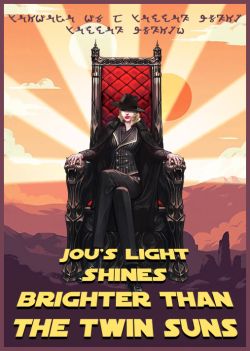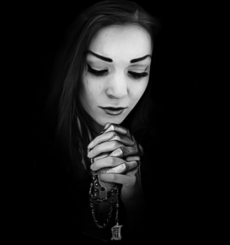Church of Jou

| |
| Church of Jou | |
| General Information | |
| Theology | Deistic |
| Headquarters | Nightwell Cathedral |
| Other names | Vorsian Orthodoxy |
The Church of Jou, also known as the Vorsian Orthodoxy, and commonly referred to as the faith, is the prevalent religious organisation of One Nation Under Jou. It was spread across all of the nation's planets to provide common ground for the new society that emerged from the creation of the nation in Year 21. The primary purpose of the Church is to offer support to the people of One Nation. The teachings are meant to inspire shared values, provide guidance to those that need it, inspire charity and offer common ground. As such the Church has more cultural than spiritual influence on the populace. Since the nation's establishment, the Church has influenced One Nation's philosophy, culture, art, music and science.
The teachings of the Vorsian Orthodoxy derive from historic events and rational thought. The faith does not support divine supernatural beings, and accepts the Force as the highest metaphysical power in the galaxy, based on observable evidence. Vigo Amaranalah Jou, the central figure of the faith, is revered as an extraordinary woman but is not attributed any divine powers to interfere in people's lives or perform miracles. Prayers to Vigo Jou are symbolic affirmation of faith and to seek comfort.
History
Vorsian Orthodoxy, as the name would imply, originated on the moon Vorsia Companion. Countess Lilith established the Church to exalt Vigo Jou so that the Vigo's decision was not forgotten and its importance could inspire others, believing it to be a fundamental part of Vorsian history. The decision by Vigo Jou was made in Year 11, however, the earliest concepts of the religion can only be traced to Year 18. Lilith's reverence towards the Vigo was well known, but it wasn't until Year 18 that she began to reference Vigo Jou as a divine figure. The event that changed Lilith's views was never explained in detail, but Lilith believes that she was contacted by the Vigo, which was the inception for her faith.
Due to Lilith's position in Vorsian society, the ideals of the faith first spread among the nobility and then gradually among the common people. This led to the official establishment of the Church of Jou. The religion remained relatively unknown to the galaxy until Year 21. When Lilith was approached with the offer to bring Morobe under her rule, she saw it as an opportunity to introduce the faith to the galaxy. The governors of Morobe welcomed the Church and its potential to unite the nation under cultural common ground.
Doctrine

Jou's Judgement
The central narrative of the religion is the Jou's Judgement. The judgement was a decision made by Vigo Amaranalah Jou in Year 11 when Lilith Delcroix offered her life as an atonement for her perceived sins against the Family. Vigo Jou showed mercy, and Llith was asked for a Gift of Flesh as per Family Justice. This decision is seen as the most important historic event, it was the catalyst which led to the eventual formation of the Vorsian state, and in extension the One Nation. Although unwillingly at the time, Vigo Jou allowed Lilith to influence the galaxy and create a better world for the Vorsian people. Without Vigo Jou's mercy, Vorsia Companion would not have been uplifted from its deteriorating conditions. Jou's Judgement serves as the prime example within the religion of how one decision can have far reaching consequences, even many years into the future.
Better worlds
The cornerstone of the Vorsian Orthodoxy is the pursuit of better worlds. It is a belief that emphases self-sacrifice and the value of putting others above personal interests, but also focusing on improving oneself and contributing to the society as a whole. Jou's Judgement serves as an example of long lasting impact one's actions might have, and belief in better worlds attempts to put that example into practicality. To have faith is to believe that every action, no matter how small, that aims to improve can lead towards a better future. If all people of the faith contribute in small ways, eventually they will all add up and have wide reaching impact. The main goal of this belief is to provide a common goal and shared social values that many can believe in, to work together and find some connection to begin to mend, heal or negotiate. This behaviour is referenced by the faithful as walking in Jou's Grace. This belief also provides a moral framework against which actions can be measured.
Vigo Jou
The Church acknowledges that Vigo Amaranalah Jou has a controversial past within the Black Sun crime syndicate, even if her past by and large is obscure and not well recorded. It is accepted that Vigo Jou cannot be holistically considered to be without fault due to her past in the syndicate, and there is no effort made by the Church to hide this fact. Vigo Jou is not revered for her past but for setting out the ideals that allowed for the eventual creation of the faith and One Nation.
It is not expected that everyone who follows the faith will have a sinless past. The faith does not strive for perfection or moral purity. Even those who are criminally minded, by choice or circumstances, are capable of acts that contribute to the betterment of society. Attempts to use Vigo Jou's past as an excuse for committing crimes is frowned upon and not supported by the Church. According to the belief in better worlds, upholding the law is necessary, just as is taking responsibility for one's actions.
Those with more apologetic attitudes further propose that within the confines of the syndicate the definition of good virtues was different. Vigo Jou was loyal to the Black Sun's Family and her actions directly contributed to the improvement of the syndicate, even if on a galactic scale many of those actions were considered criminal by laws common among governments. Undoubtedly, Vigo Jou would have to answer for her actions within certain parts of the galaxy, but laws are limited to the territory upon which they have jurisdiction, and it is not One Nation's place to judge and trial those outside of its own territory.
Worship

The faith does not have a rigid worship structure or demands. The main form of worship is reflected in everyday decisions. The faithful are expected to choose whatever path leads them towards the ideal, the better world, no matter how small the impact of their decision. It is taught by the priests that creating a better world starts with taking care of one's self, their surroundings and so on, until collectively the society would reach the ultimate ideal. Such practices are not unique to the faith, but with the prevalence of the Church in the nation's society, the teachings are commonplace in the public's attention.
The faithful are encouraged to take a personal approach to worship, and decide for themselves how to include the faith in their lives; such as creating their own private prayers. There are common prayers offered by the priests that people can default to or use for inspiration. Praying is most often done in personal space, but during services some are sung as hymns. Some of the faithful also chose to recite gratitude before meals.
The formal ways of worship within the local churches and cathedrals are symbolic and aim to provide communal space for social interactions, rather than demanding attendance. Services of certain symbolic dates are attended frequently due to their advertising, and attendance of the royal family and other public figures.
Litanies of Faith
The collective of common prayers, hymns and the scripture is referred to as Litanies of Faith, a book that is found at all churches, and is often owned by the faithful. In essence, the book is a guide to the faith and it's history.
Structure
The Church has a vast structure not dissimilar to a corporation. The most notable and publicly known roles are those of the various priests from local churches, given their prominent role in communities. Behind the scenes, the Church has internal groups for maintenance and logistics, among others. The Church also has its own security force, soldiers trained with the duties of priests. Their main job is protection of property (such as churches and warehouses), and offering protection to travelling priests and pilgrims. Although not confirmed, it is assumed the Church is also involved in the training of Force Sensitive citizens.
Iconography

The most common symbol of the Church is a stylized letter J, the first letter of Vigo Jou's surname. The Church is also often represented with icons of the sun and the crown of sunlight.